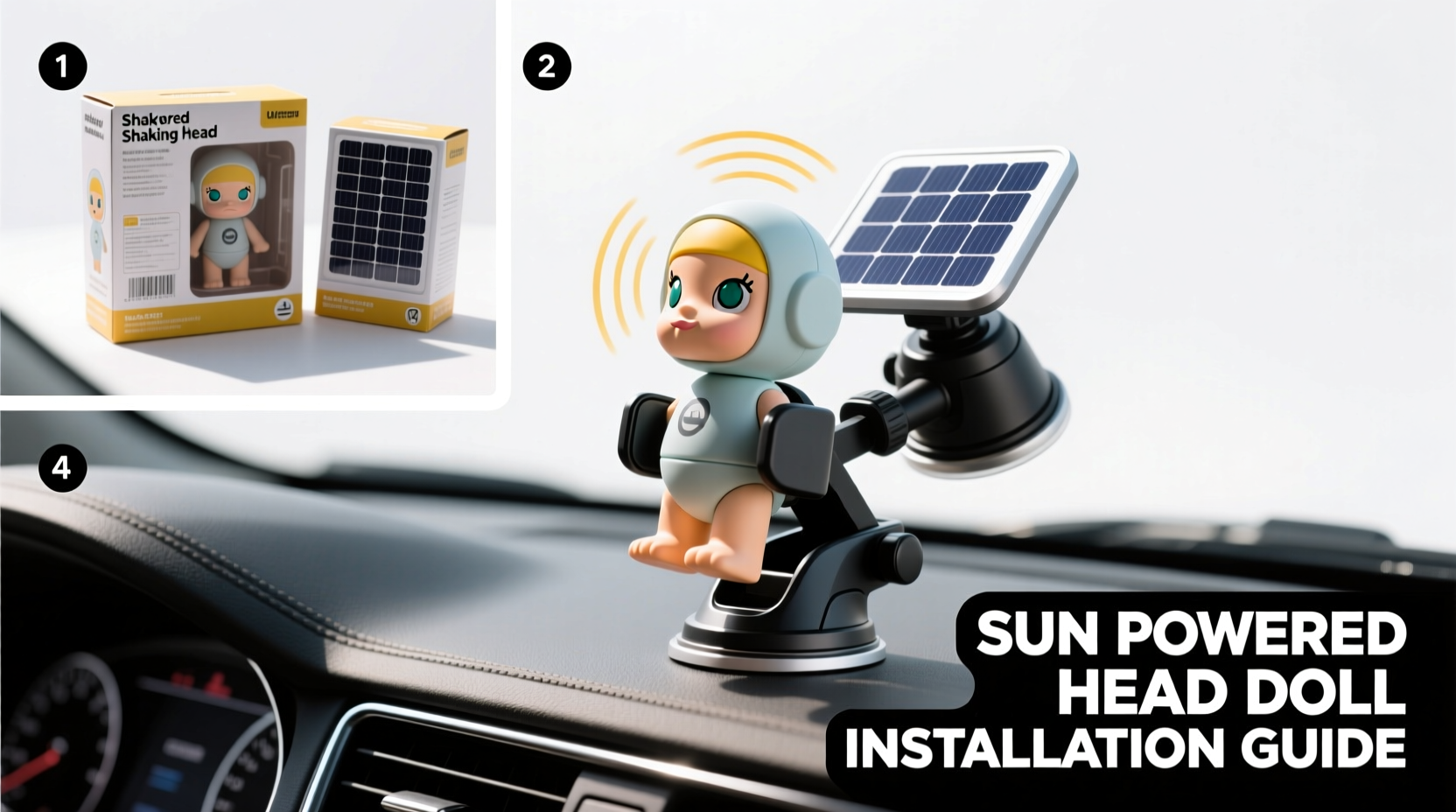Solar-powered shaking head dolls have become a popular accessory for car interiors, combining whimsy with energy-efficient technology. These small figurines use ambient light to power a gentle nodding or shaking motion, adding personality to your dashboard without drawing from your vehicle’s battery. While they appear simple, improper installation can lead to glare, instability, or even interference with driving visibility. This comprehensive guide walks you through the correct way to install one safely and securely—ensuring both function and safety.
Understanding How Solar Shaking Head Dolls Work

These novelty items operate using a small photovoltaic cell that converts sunlight or indoor lighting into electrical energy. This powers a micro motor inside the base, creating the signature back-and-forth head movement. Because they require no wiring or batteries, they are low-maintenance and eco-friendly. However, their performance depends heavily on placement—specifically access to consistent light.
The internal mechanism is delicate. Excessive vibration, direct heat exposure, or poor mounting can reduce lifespan or cause erratic motion. Understanding the technology helps inform smarter installation choices.
Essential Tools and Materials
No special tools are required, but having the right supplies ensures a clean, secure setup. Most solar dolls come with adhesive bases, but replacements or upgrades may be necessary depending on your car’s dashboard texture.
| Item | Purpose | Recommended Type |
|---|---|---|
| Solar shaking head doll | Main decorative unit | With UV-resistant casing |
| Adhesive pad | Mounting base | 3M dual-lock or gel pad |
| Isopropyl alcohol wipe | Cleaning surface | 70%+ concentration |
| Microfiber cloth | Wipe down area | Lint-free |
| Ruler or measuring tape | Ensure proper positioning | Flexible or rigid |
“Placement is everything. A well-mounted solar doll can last years, while a poorly secured one becomes a distraction—or worse, a projectile.” — Marcus Lin, Automotive Interior Safety Consultant
Step-by-Step Installation Guide
Follow this timeline-based process to install your solar doll correctly and safely.
- Choose the Right Location
Select a spot on the dashboard within view but not obstructing the windshield, instrument cluster, or air vents. Ideal zones are to the far right (passenger side) or left of the steering column, where sunlight reaches consistently without reflecting into the driver’s eyes. - Check for Airbag Zones
Avoid placing any object over or near labeled airbag deployment areas. Most modern cars have passenger-side airbags built into the dashboard. Installing a doll here risks injury during inflation. - Power Off and Cool Down
Turn off the vehicle and allow the interior to cool if parked in direct sun. Hot surfaces reduce adhesive effectiveness. - Clean the Surface
Use an alcohol wipe and microfiber cloth to remove dust, oils, and residues. Wipe in circular motions and let dry completely—this step is critical for long-term adhesion. - Prepare the Doll’s Base
If using a new adhesive pad, peel off the backing slowly. Avoid touching the sticky surface with fingers to prevent oil transfer. - Position and Press Firmly
Align the doll carefully. Once placed, press down with steady pressure for 20–30 seconds to ensure full contact. Do not adjust after initial placement. - Wait Before Driving
Allow at least one hour before operating the vehicle. This gives the adhesive time to bond, especially in cooler environments. - Test Functionality
Drive into a sunny area or park facing the sun. Observe whether the head begins to move within 1–2 minutes. If not, reposition slightly toward more direct light.
Common Mistakes to Avoid
- Blocking the driver’s line of sight – Even small objects can create blind spots when positioned too high.
- Using weak adhesives – Foam stickers from cheap toys often fail within days. Invest in industrial-grade pads.
- Ignoring temperature extremes – Prolonged exposure to heat above 140°F (60°C) can warp plastic components and degrade electronics.
- Mounting near HVAC vents – Constant airflow may interfere with balance or cause unnatural movement.
Real-World Example: Sarah’s Commute Upgrade
Sarah, a rideshare driver in Phoenix, wanted to personalize her car to make passengers feel welcome. She purchased a solar panda doll with a waving head motion. Initially, she placed it near the center console, but noticed it cast a shadow on her speedometer in midday sun. After reading about safe placement, she relocated it to the far passenger side, cleaned the surface thoroughly, and used a 3M gel pad. The doll now activates reliably under sunlight, delights her riders, and has remained securely mounted for over eight months—even through summer heat waves exceeding 115°F.
Maximizing Performance and Longevity
To get the most out of your solar doll, consider these maintenance practices:
- Wipe the solar panel gently once a week with a damp microfiber cloth to remove dust buildup.
- Rotate the doll occasionally to prevent uneven wear on the internal gears.
- Remove it during car washes or steam cleaning to avoid moisture damage.
- Store indoors during extended periods of non-use, especially in extreme weather.
Frequently Asked Questions
Can solar shaking head dolls work at night?
No, they require a light source to activate. Some models store minimal residual energy, allowing brief motion after sunset, but consistent operation only occurs in daylight or under strong artificial lighting.
Are these dolls safe during accidents?
When properly installed away from airbag zones and using secure mounts, they pose minimal risk. However, loose or poorly adhered dolls can become projectiles. Always ensure firm attachment and avoid placing multiple heavy ornaments together.
Will the adhesive damage my dashboard?
High-quality removable pads (like 3M) are designed to leave no residue when removed carefully. To minimize risk, warm the base gently with a hairdryer on low heat and peel slowly. Avoid using solvents unless necessary.
Final Checklist Before You Drive
📋 **Installation Verification Checklist**- ✅ Doll is mounted outside airbag deployment zone
- ✅ No obstruction to windshield or instrument panel
- ✅ Surface was cleaned with alcohol before application
- ✅ Adhesive was pressed firmly for at least 30 seconds
- ✅ Doll activates under natural light
- ✅ No loose parts or wobbling detected
Conclusion: Add Personality Without Compromising Safety
A solar-powered shaking head doll is more than just a quirky decoration—it’s a reflection of personal style and attention to detail. When installed correctly, it enhances your driving experience without distracting from safety or functionality. By following these steps, you protect your investment, maintain a clean interior, and ensure compliance with best practices for automotive accessories. Whether you're customizing your daily commuter or making your rideshare stand out, take the time to do it right.









 浙公网安备
33010002000092号
浙公网安备
33010002000092号 浙B2-20120091-4
浙B2-20120091-4
Comments
No comments yet. Why don't you start the discussion?